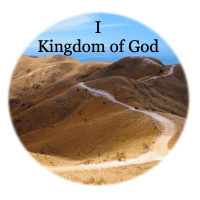Kingdom of God 8 (Eastern): The Rich Man and Lazarus — Unveiling Two Kingdoms

 The Spiritual Mysteries of the Divine Calendar: The Rich Man and Lazarus — Unveiling Two Kingdoms ~ October 26 – November 1, 2025 ~
The Spiritual Mysteries of the Divine Calendar: The Rich Man and Lazarus — Unveiling Two Kingdoms ~ October 26 – November 1, 2025 ~ During the weeks of the first Season of Salvation in the Divine Calendar, the Holy Spirit draws our attention to a specific weakness that God seeks to redeem this year, releasing our feet to advance further in His plan. In this eighth week of the Season of the Kingdom of God, we explore the story of the Rich Man and Lazarus to uncover obstacles that hinder the expansion of God’s Kingdom within our souls.
The Previous Weeks of the Season of the Kingdom of GodTo help us reflect on our journey through this year’s Divine Calendar, here is the overview of the previous weeks in the Season of the Kingdom of God:
Week 1: The Church New Year (Indiction)
Week 2: Repentance — A Turn Toward What?
Week 3: Moving Out of the Box in Our Spiritual Life
Week 4: Fruitless Nights Without Jesus
Week 5: Overflowing to Fulfill the Commandment of Love
Week 6: The Widow of Nain: How Life Overcomes Death
Week 7 (Last Week): Spiritual Battles — Lessons from Jesus
However, if you attend an Eastern Old Calendar parish, this week would be Week 6. I believe you will find the post The Widow of Nain: How Life Overcomes Death especially evocative, even though it includes the Gospel reading for the New Calendar.
A Crucial Key
Let us begin by taking a practical look at the key to entering the mysteries and receiving the graces of the Season of the Kingdom of God: repentance.
Repentance is vital year-round—and it can even become a way of life, as illustrated by the tax collector who “standing afar off, would not so much as raise his eyes to heaven, but beat his breast, saying, ‘God, be merciful to me a sinner!’” (Luke 18:13).
The Fathers of the Church speak of acquiring the spirit of repentance. The Psalmist writes, “The sacrifices of God are a broken spirit, a broken and a contrite heart—these, O God, You will not despise” (Ps. 51:17).
The reason we seek humility is beautifully expressed in Isaiah 57:15: “For thus says the High and Lofty One Who inhabits eternity, whose name is Holy: ‘I dwell in the high and holy place, with him who has a contrite and humble spirit, to revive the spirit of the humble, and to revive the heart of the contrite ones.’”
To Settle Accounts at the End of the Day
How can we do this? At the end of each day, we can draw inspiration from an old monastic practice to “settle accounts” (Matt. 25:19). Before going to sleep, we may spend a few minutes asking the Holy Spirit to reveal anything that occurred during the day that grieved “the Holy Spirit of God” (Eph. 4:30). We do not need to painstakingly dissect every event, but simply be still and invite the Spirit to show any sins in deed, word, or thought.
If nothing immediately comes to mind—and often we can sense if something specific need attention even before we begin praying—we can reflect on the Two Great Commandments (Matt. 22:36–39). We examine how we may have failed to love God with all our being and our neighbor as ourselves. Often, beginning with these commandments brings to light other events we can confess before the Lord.
When we feel there is nothing more to confess, we thank Jesus for the forgiveness granted through His sacrifice. We then ask the Holy Spirit for the grace to fill us and help us avoid repeating the same sins. Finally, we try to find a Scripture that speaks to what we have confessed and pray it, declaring God’s truth over ourselves and the situations.
Summary of Reviewing Our Day with the Holy Spirit
To summarize this daily practice of settling accounts:
Ask the Holy Spirit to reveal anything we did or neglected to do that grieved Him.Confess our sins before Jesus and receive His forgiveness.Ask for the grace of the Holy Spirit to enable us to walk in righteousness and holiness.Seal the healing that accompanies confession by praying a relevant Scripture passage over our lives.If we follow up by going to confession in church, it is helpful to confess the main points we have been praying about during the daily settling of our spiritual accounts.
Let is now turn to the story of the Rich Man and Lazarus.

Photo by Cederic Vandenberghe on Unsplash
Sunday Gospel for the Rich Man and Lazarus: Luke 16:19–31 (NKJV)“There was a certain rich man who was clothed in purple and fine linen and fared sumptuously every day. 20 But there was a certain beggar named Lazarus, full of sores, who was laid at his gate, 21 desiring to be fed with the crumbs which fell from the rich man’s table. Moreover the dogs came and licked his sores. 22 So it was that the beggar died, and was carried by the angels to Abraham’s bosom. The rich man also died and was buried. 23 And being in torments in Hades, he lifted up his eyes and saw Abraham afar off, and Lazarus in his bosom.
24 “Then he cried and said, ‘Father Abraham, have mercy on me, and send Lazarus that he may dip the tip of his finger in water and cool my tongue; for I am tormented in this flame.’ 25 But Abraham said, ‘Son, remember that in your lifetime you received your good things, and likewise Lazarus evil things; but now he is comforted and you are tormented. 26 And besides all this, between us and you there is a great gulf fixed, so that those who want to pass from here to you cannot, nor can those from there pass to us.’
27 “Then he said, ‘I beg you therefore, father, that you would send him to my father’s house, 28 for I have five brothers, that he may testify to them, lest they also come to this place of torment.’ 29 Abraham said to him, ‘They have Moses and the prophets; let them hear them.’ 30 And he said, ‘No, father Abraham; but if one goes to them from the dead, they will repent.’ 31 But he said to him, ‘If they do not hear Moses and the prophets, neither will they be persuaded though one rise from the dead.’”
The Rich Man
We read in Luke 16:19: “There was a certain rich man who was clothed in purple and fine linen and fared sumptuously every day.”
In Jesus’ story of the rich man and Lazarus, we see two men living vastly different lives. One dwells securely in the kingdom of himself, while the other lives in the Kingdom of God. The rich man’s extravagant lifestyle reflects that “the rich man’s wealth is his strong city” (Prov. 10:15).
We know that money itself is not the root of all evil, “for the love of money is a root of all kinds of evil, for which some have strayed from the faith in their greediness” (1 Tim. 6:10). Jesus warns, “How hard it is for those who trust in riches to enter the kingdom of God! It is easier for a camel to go through the eye of a needle than for a rich man to enter the kingdom of God” (Mark 10:24b–25).
The Apostle Paul also instructs, “Command those who are rich in this present age not to be haughty, nor to trust in uncertain riches but in the living God, who gives us richly all things to enjoy” (1 Tim. 6:17).
Yet in this story, the rich man is placed at the center. Every verse, except verses 20–22, is told from his perspective. God seeks to reach the heart of this man by placing at his doorstep someone who lives a radically different life.
Lazarus
In Luke 16:20–21, we read: “But there was a certain beggar named Lazarus, full of sores, who was laid at his gate, desiring to be fed with the crumbs which fell from the rich man’s table. Moreover the dogs came and licked his sores.”
We know little about Lazarus, yet he is clearly in a miserable state of poverty and sickness. But why was he placed there? Jesus tells us that Lazarus longed to feed on the rich man’s crumbs. The general lessons from this story include the value of caring for the sick and poor, that God regards every person equally regardless of social status, and that God’s judgment at the end of our lives is just. Yet there is more to poor Lazarus that these lessons alone.
We read in Luke 16:22–23: “So it was that the beggar died, and was carried by the angels to Abraham’s bosom. The rich man also died and was buried. And being in torments in Hades, he lifted up his eyes and saw Abraham afar off, and Lazarus in his bosom.”
This reminds us that our adoption as children of God does not depend on earthly wealth. Modesty appears to be the safest path, as Proverbs teaches: “Give me neither poverty nor riches—feed me with the food allotted to me; lest I be full and deny You, and say, ‘Who is the Lord?’ Or lest I be poor and steal, and profane the name of my God” (Prov. 30:8b–9).

Photo by Drew Dau on Unsplash
Placing Our Security in ChristRiches can fuel our pride and love of power, while poverty can certainly humble us. Yet, in the right hands, wealth can serve the expansion of God’s Kingdom, and poverty caused by irresponsible living can hinder His plan for our lives.
The key is to place our security in Christ, as the Apostle Paul writes: “Not that I speak in regard to need, for I have learned in whatever state I am, to be content: I know how to be abased, and I know how to abound. Everywhere and in all things I have learned both to be full and to be hungry, both to abound and to suffer need. I can do all things through Christ who strengthens me” (Phil. 4:11–13).
The judgment of these two men’s lives reveals their relationship with God while they lived. The rich man seemed to trust in his own kingdom and cared little for the God of Israel. It even appears that he did not help Lazarus—even though the beggar lay at his gate—since Lazarus received “evil things” in his lifetime but is now “comforted” (verse 25).
Lazarus, this poor and suffering child of God, had been placed at the gate of the rich man for an unknown period of time before he was “carried by the angels to Abraham’s bosom” (verse 22). Clearly, he loved his God.
The Rich Man and Lazarus: Blinded by Riches
I believe the rich man must have noticed something was different about poor Lazarus. I envision Lazarus as a light version of Job, who—amid suffering—clearly demonstrated his reverent fear of God: “Shall we indeed accept good from God, and shall we not accept adversity?” (Job 2:10b).
Yet the testimony of Lazarus’s faith in God’s care did not impact the rich man. If this homeless man, suffering from sickness, trusted God in his poverty, how much more should the rich man have trusted God for his riches?
We read in Deuteronomy: “Then you say in your heart, ‘My power and the might of my hand have gained me this wealth.’ And you shall remember the Lord your God, for it is He who gives you power to get wealth” (Deut. 18:17–18a). The poor man’s life should have been an eye-opener for the rich man, showing him that his own kingdom blinded him to the true Kingdom of Heaven.
The Rich Man and Lazarus: The Brothers
At the end of the Sunday Gospel, we understand why the rich man never turned to God, even though he saw Lazarus each time he entered or left his mansion. We read in Luke 16:31: “But he said to him, ‘If they do not hear Moses and the prophets, neither will they be persuaded though one rise from the dead.’”
In his torment, the rich man pleaded with Abraham to send Lazarus to his five brothers, hoping that if Lazarus rose from the grave, they would believe. His request reveals something about Lazarus’s visible faith: “I beg you therefore, father, that you would send him to my father’s house, for I have five brothers, that he may testify to them, lest they also come to this place of torment” (Luke 16:27–28).
But Abraham replied that the brothers already had Moses and the prophets to instruct them about the Kingdom of God—and that these Scriptures bear a testimony as powerful as someone rising from the dead. The rich man’s five brothers—likely with the same mindset, since the rich man feared “they also come to this place of torment”—did not truly believe the Word of God, just as he had not.
The Rich Man and Lazarus: Good-Looking Disbelief
The rich man’s unbelief in the reign of God’s Kingdom over his life kept him excluded from it. Instead, he built an impressive and good-looking empire for himself, where he could reign as king.
Here lies the central lesson of this Sunday Gospel: when any part of our inner life is not surrendered to the Lordship of Christ, we grow self-sufficient, which eventually blinds us to the truth. This aesthetic unbelief keeps us unaware of how that part of our life might look if it were fully surrendered to God’s reign.
God may send a particular person or lead us into a recurring situation to reveal a testimony of faith we never truly considered. May the Holy Spirit help us uncover every trace of disbelief or beautifully disguised resistance to the Kingdom of God. And may we find joy in a deeper surrender to His loving leadership over our lives.
Concluding the Rich Man and Lazarus — Unveiling Two KingdomsI feel honored that you took the time to read. I pray that God may bless and lead you into a new week in the Season of the Kingdom of God.
Please leave a comment below—we’d love to hear your thoughts. If you found this post helpful, feel free to share it using the buttons at the top of the page.
Join the Journey Through the Seasons of SalvationJoin us on this weekly journey through the Seasons of Salvation as we walk in the footsteps of Jesus Christ through the key seasons of His life.
Sign up to receive this year’s Divine Calendar, which introduces the Seasons of Salvation and guides you through the journey ahead. As a welcome gift, you’ll also receive my young adult novel, The Legend of the Divine Calendar, delivered straight to your inbox.
Visit the Seasons of Salvation blog for insights into the coming week, posted every Saturday. We’d be honored to have you join us.
Save Your Prayer Card on Your Smartphone

Photo by Jusdevoyage on Unsplash
The post Kingdom of God 8 (Eastern): The Rich Man and Lazarus — Unveiling Two Kingdoms first appeared on Father Elisha: Let me take you on an intriguing journey..



